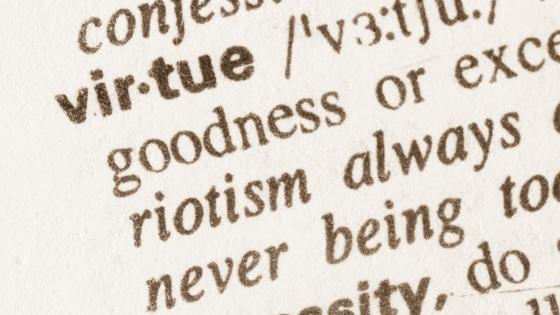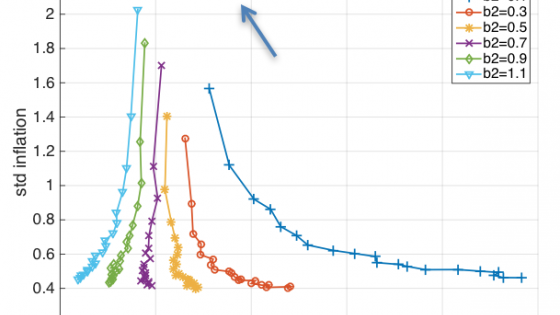We interpret psychological traits, including character traits and virtue, as strategies that shape actions – responses to situations – determined by underlying endowments, preferences, and resources, as well as incentives to act in situations. Philosophers of virtue consider it to be a certain kind of practice in pursuit of a worthy goal. Psychologists consider it to be a trait or endowment, and they often equate individual traits with individual measured behaviours. However, our analysis shows that, at an empirical level, traits are not localised to individual behaviours. Both emotion and reason shape the expression of virtue (Phelps 2009).
Virtue ethics make important distinctions that inform economic research. It introduces crucial concepts such as intention and deliberation into the measurement of behaviour and personality. It emphasises the distinction between intrinsic rewards associated with Aristotelian virtue and extrinsic rewards, which motivates much economic analysis and many policy prescriptions.
The ‘person versus situation’ debate initiated by Mischel (1968) and embedded in much of behavioural economics proposes a stark dichotomy between an invariant trait (embodied in the person) and the role of incentives (the situation) in shaping actions. Using economics and Aristotelian notions, we sharpen the notion of what constitutes traits and why measured traits are strategies motivated by preferences and not fixed, invariant attributes.
We build on recent research on the technology of skill formation (Cunha and Heckman 2008) and habit formation (Pollak 1970, 1976, Becker and Murphy 1988) that formalises how virtuous conduct can be developed by imitation, practice, teaching, investment, and mentoring.
Defining virtue
For Aristotle, virtue for an adult has the following five properties:
- It is a relatively stable interrelated set of dispositions.
- This disposition guides feeling, thinking, acting, and conceiving of one’s situation.
- It is admirable.
- It is beneficial to the agent and to society.
- It is often assumed that it is widely applicable across an individual’s life. It is ‘enduring’ over activities at a point in time and over time.
In Meno, Socrates argues that, while virtue can be taught, no one (at least in the ancient Athens of his day) could do so. In that context, it is a gift of God. This is not, however, a consensus view. Aristotelian virtue is not an immutable trait; evolving traits influence virtuous practice. Aristotle discusses the acquisition of virtue as a practice (Aristotle et al. 1980, Callard 2020, 2022, Kraut 2022, and Athanassoulis 2013).
Integrating virtue into the economists’ model of choice
Our recent paper (Heckman et al. 2023) focuses on self-control as an essential aspect of Aristotelian virtue ethics. It adopts basic ideas in the standard model of choice in economics and examines its suitability for the study of virtue ethics. It is a framework that can be used to discuss self-control and virtue more generally.
Agents are assumed to have preferences over vectors of possible choices. A numerical evaluation of outcomes describes the set of choices an individual can make. The feasible choices that persons can make depend on characteristics that agents possess in all situations, mediated by their actions and efforts. Outcomes are multidimensional, and each dimension refers to a particular component of choice (e.g. the outcome for the first dimension could be the performance of a public service).
Economists conceptualise goals that motivate choices in terms of ‘utility maximisation’. Each choice is associated with a ‘utility function’ that agents aim to maximise. Utility can be internal satisfaction with ethical behaviour or eudaimonic happiness.
Not all possible choices may be feasible for an individual. An obvious example involves consumption. One’s wealth delimits one’s possible bundles of goods to consume. Thus, different virtuous acts may be mutually exclusive given the constraints faced by agents. If the utility of a vector of choices has maximal utility among those that are feasible, it is chosen. As a numerical representation of an underlying preference ordering, the utility function does not directly speak to why an agent prefers one set of choices to another.
In thinking about virtue, one special case of interest is that of lexical preferences, where an agent prefers a particular outcome above everything else. In other words, an agent always chooses that outcome without regard for the other possible outcomes. Moral preferences may take this form. Lexical preferences impose a constraint on the way a person orders the world. Thus ‘thou shalt not kill’ is a constraint on behaviour that may govern all choices. At no price will one kill (‘life’ is thus a lexical argument of utility).
We present a generalisation of Aristotelian virtue. An agent has a ‘golden mean’ that is the ethical goal of an agent specified by his/her reflective preferences. Agent utility in terms of departures from the golden mean is the difference between the utility an agent currently realises and the utility from being at the golden mean. The difference depends on the preferences and traits of agents. The marginal benefit of deviating from the golden mean considers small increment deviations, holding everything else constant. As agents get beyond their ideal points of the golden mean, more deviation has lower marginal value.
Our model is a vector version of Aristotle’s principle of the golden mean: excess in either direction is disfavored. Agents often choose values of the outcome less than the golden-mean values because resources are limited, and agents cannot attain the golden mean. There are two tradeoffs: in the constraints and in the preferences. Because of limited resources, goals may need to be traded off.
Processes of development of virtue
Aristotle writes extensively about the formation of virtue through practice and guidance. This experience-dependent approach is consistent with models of learning skills in economics. Eventually, traits can become perfected and virtuous behaviour can become virtually automatic – although automatic behaviour without intention and self-reflection is not virtuous.
Consider an outcome which may be perceived as virtuous. This outcome depends on performance, effort, preference, and the information available to the agent. An agent has an ideal self (e.g. an ideal weight, health, ranking in world scholarship), but is currently not at the level of this ideal self, and there is a cost of falling short of the goal in terms of the deviation from the ideal point.
Advancing toward a goal is costly. It takes effort or may cause some other goal to be compromised, or both. Adjustment is associated with education and intervention. In a world of two periods, the agent in period 0 has an initial value. He seeks to maximise his wellbeing. The higher the per unit cost of departure from the initial position relative to the cost of adjustment, the farther the agent is from the ideal self. Constraints in costs affect the cost of adjustment. These costs may be due to personality attributes (lethargy, etc.). Goals and motivations enter through the per unit cost of movement toward the ideal level. With sufficient practice, the cost of attaining virtue may be zero.
Evidence on the power of interventions to shape traits, personality, and virtue
Callard (2022) notes that the formation of virtue is an essential aspect of Aristotle’s notion of partial virtue. Virtue itself can be perfected through learning by education, mentoring, imitation, and practice. We now present five striking patterns across numerous interventions across the lifecycle that affect the formation of virtue.
First, generalised intervention programmes are shown to have positive impacts on specific personality traits that were not targeted initially. One example is the Balu und Du mentoring programme in Germany (Kosse et al. 2020, Abeler et al. 2021). The programme’s curriculum was not specifically designed to augment particular personality features. Yet, four years after the intervention, Abeler et al. (2021) find that treated children were much more honest than the control group. This finding is consistent with the proposed mechanism of virtue development, wherein children practice virtues based on imitating prosocial mentors (see Callard 2022).
Second, personality interventions have stronger and more persistent positive effects on personality and social outcomes than cash transfer programmes (e.g. Blattman et al. 2022). Third, interventions are most effective for participants who are at the highest risk at baseline (e.g. Abeler et al. 2021, Blattman et al. 2022). Fourth, successful interventions often can be replicated in other environments (e.g. Elango et al. 2015, Zhou et al. 2022, García and Heckman 2022). Finally, treatment effects for interventions on measured traits arise through different channels (e.g. Cappelen et al. 2020). These five patterns offer insights for policymakers and philosophers of virtue.
Summary and conclusion
Our paper uses simple economic models to clarify the concepts of virtue ethics developed by Aristotle and places them in a well-defined economic framework. We give empirical content to Aristotelian notions of virtue and its development. Aristotle’s ideas that habituation, mentorship, and parenting produce virtue and character skills are documented by drawing on a variety of intervention studies. Consistent practice of virtue builds traits that make it more likely to be virtuous in the future in the face of competing claims for human action.
References
Abeler, J, A Falk, and F Kosse (2021), “Malleability of preferences for honesty”, CEPR Discussion Paper 16164.
Aristotle, W D Ross, J Urmson, and J Ackrill (1980), The Nicomachean ethics, Volume 546, Oxford paperbacks, Oxford University Press.
Athanassoulis, N (2013), “Bloomsbury ethics”, Virtue Ethics (1st ed.), Bloomsbury Publishing.
Becker, G S, and K M Murphy (1988), “A theory of rational addiction”, Journal of Political Economy 96(4): 675–700.
Blattman, C, S Chaskel, J C Jamison, and M Sheridan (2022), “Cognitive behavior therapy reduces crime and violence over 10 years: Experimental evidence”, National Bureau of Economic Research.
Callard, A (2020), “Aristotle on deliberation 1”, in The Routledge Handbook of Practical Reason, Routledge.
Callard, A (2022), “The virtuous spiral: Aristotle’s theory of habituation”, Oxford Handbook of Moral Psychology, Oxford University Press.
Cappelen, A, J List, A Samek, and B Tungodden (2020), “The effect of early-childhood education on social preferences”, Journal of Political Economy 128(7): 2739–58.
Cunha, F, and J J Heckman (2008), “Formulating, identifying and estimating the technology of cognitive and noncognitive skill formation”, Journal of Human Resources 43(4): 738–82.
Elango, S, J L García, J J Heckman, and A Hojman (2015), “Early childhood education”, in Economics of Means-Tested Transfer Programs in the US, volume 2, University of Chicago Press.
García, J L, and J J Heckman (2022), “Parenting promotes social mobility within and across generations”, Annual Reviews 15: 349–88.
Heckman, J J, B Galaty, and H Tian (2023), “The economic approach to personality, character and virtue”, in R Lerner (ed.), Multidisciplinary Handbook of Character Virtue Development, Taylor and Francis, forthcoming.
Heckman, J J, B Galaty, and H Tian (2023), “The economic approach to personality, character and virtue”, NBER Working Paper w31258.
Kosse, F, T Deckers, P Pinger, H Schildberg-Hörisch, and A Falk (2020), “The formation of prosociality: Causal evidence on the role of social environment”, Journal of Political Economy 128(2): 434–67.
Kraut, R (2022), “Aristotle’s ethics”, in E N Zalta and U Nodelman (eds.), Stanford Encyclopedia of Philosophy (Fall 2022 ed.), Metaphysics Research Lab, Stanford University.
Mischel, W (1968), Personality and assessment, New York: Wiley.
Phelps, E A (2009), “Chapter 16 – the study of emotion in neuroeconomics”, in P W Glimcher, C F Camerer, E Fehr, and R A Poldrack (eds.), Neuroeconomics, Academic Press.
Pollak, R A (1970), “Habit formation and dynamic demand functions”, Journal of Political Economy 78(4, Part 1): 745–63.
Pollak, R A (1976), “Habit formation and long-run utility functions”, Journal of Economic Theory 13(2): 272–97.
Zhou, J, J Heckman, B Liu, and M Lu (2022), “The impacts of a prototypical home visiting programme on child skills”, NBER Working Paper 27356.





